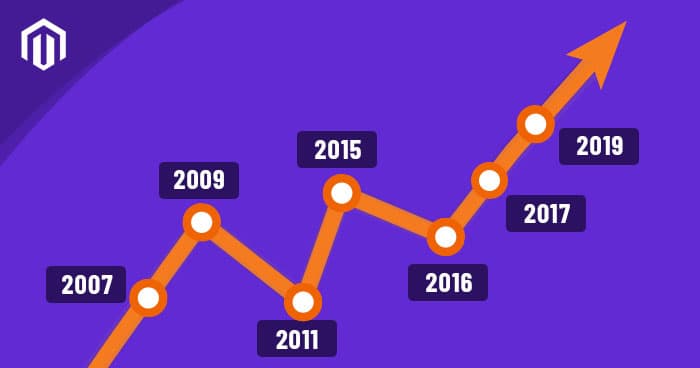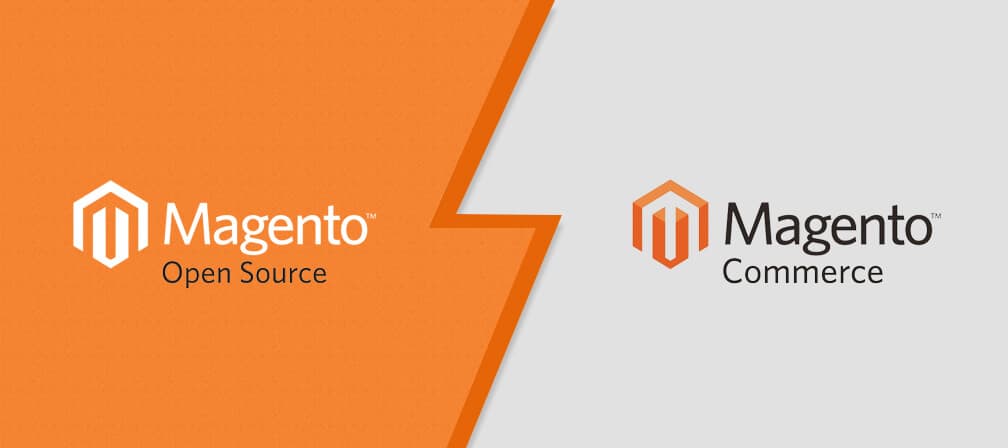
Magento was launched in March 2008 by the Californian company Varien Inc (now called Magento Inc). A few years later this company sold a portion of the company to the eBay company. Although, eventually, years later eBay acquired Magento completely.
In May 2018, Magento was acquired by Adobe for a whopping $1.68 billion. This, as we will see later, represents an important economic muscle for The future of Magento as an e-commerce platform; which ensures its maintenance and development.
Magento is the leading e-commerce platform (CMS) for large and medium-sized enterprises. When a company that sells online starts billing a considerable figure on its digital channel, its choice of online store CMS, yes or yes, should be Magento. Therefore, for these high billing companies, developing Magento for your eCommerce should be an obligation.
Any other CMS for eCommerce, as could well be Prestashop or WooCommerce,although they might work, they would not have the same power, versatility and, above all, they would not be as prepared for SEO. It’s not that a high-end company can’t use these CMSs that we just said, just that they wouldn’t be taking all the power that a large eCommerce needs.
Companies such as Samsung, Nike, Hero, Ford, Foxconnect, Lenovo, Olympus, Men’s Health, Vizio, Nestle, and many more – even medium and even small businesses – have chosen Magento as their e-commerce CMS.
This is not to say that small and medium-sized businesses cannot use Magento as a platform for their online store. If a company has the budget to carry out a development in Magento, this should be their first choice. Although if you don’t have the necessary budget, then you should opt for other, more affordable options. Developing a well-programmed Magento is neither a simple or quick task. If you want to do it right, you will need resources and time to do it.

Magento is by far the leading platform in the B2B sector. Magento brings its own intrinsic characteristics that make it the best CMS for the B2B sector. With the latest versions of Magento it has been possible to incorporate in its base programming a number of features that make it especially attractive for this sector. It incorporates unique features prepared for the B2B without the need for external modules. So, if you are a company that is engaged in B2B sales and your turnover is considerable, Magento should be your choice.
User group control is done in a very easy and intuitive way in Magento’s backend. Therefore, it is very easy for the administrator to assign different prices or discounts to certain groups of users. Custom pricing rules can also be applied for each particular user.
For the B2C Magento sector it is also the choice of large and medium-sized companies. Its power and customization make it especially attractive when it comes to choosing the right CMS for all types of business. Although if there is one thing that stands out more Magento is because of the SEO capacity for eCommerce that we can apply to our online store. By allowing us a lot of customization, we have the ability to customize every SEO field that our online store needs.

The Magento Open Source version used to be called Magento Community Edition. Its main feature is that it is open source. This means that any agency specialized in Magento can modify the Magento codebase without any problem. A good Magento development involves doing well; this means that to develop new functionalities or extend any of Magento’s codebase, you must take over programming external modules or extensions that do not compromise future Magento updates.
This option is the cheapest of the 3 and the one that most companies choose. A good Magento development partner can make your Magento Open Source perform any functionality that is required or needed.
Most importantly, Magento will remain Open Source after its acquisition by Adobe. Your code can be found on your Githubprofile page. There we will be able to observe all the code changes that are being developed. In this way, we can see what is the most important or future functionalities that the leading eCommerce company intends to bringout.
The Magento Commerce version (formerly known as Magento Enterprise Edition)is derived from the Magento Open Source version. By far, it has the same codebase in terms of programming. The main difference with its sister version is that Magento Commerce is not free. In return, it includes a number of features and functionalities that does not include the Open Source version (although as we have already mentioned, it could have the same features and functionalities if an expert company develops custom modules for the Open Source version).
This version of Magento is designed for large companies with a lot of billing in the online sector and that require a lot of help in the installation, configuration and customization of the platform. The price of this version is determined by annual maintenance fees that are not exactly cheap.
Thus, Magento is currently the market-leading CMS e-commerce platform in terms of online stores. If the necessary budget is available, Magento should always be the first and only option to value. Once we are sure that we will use Magento as our platform to sell products online, we will have to choose which version we will use between Magento Open Source and Magento Commerce. Our recommendation will also be imposed by the budget available and the needs and characteristics of each type of business or online store.
If we have enough budget and, in addition, the basic functionalities that Magento Commerce brings fit our requirements, this should be our choice. However, if we have less budget or if the functionalities that the Commerce version comes to the base are not necessary for our particular requirements, we will choose the Magento Open Source version. With the Open Source version we can get to develop any functionality that is desired, so the paid version in this case would not be necessary. In addition, we can devote some of that savings to planning a good marketing strategy.
And, in your company, do you encourage yourself to move to Magento or to stick with him but with Kiwop?
If you want to have the website you want or increase the online visibility of your brand, we know how to do it.
Shall we start today?
Leave a Reply